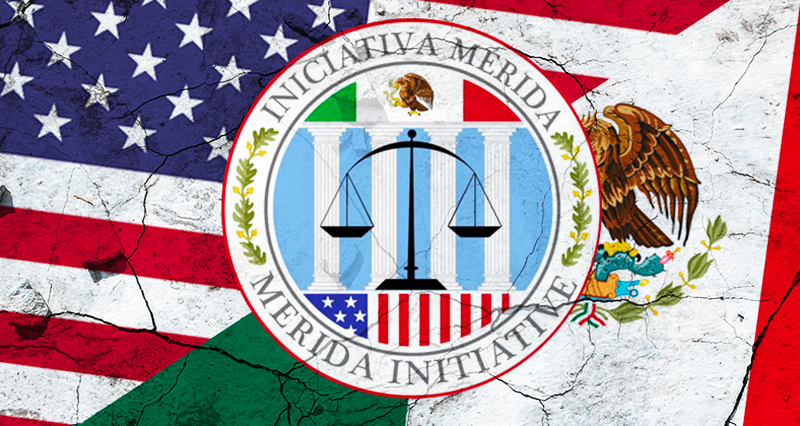Mexico’s Foreign Minister Marcelo Ebrard evaluated the so-called Merida Initiative, which regulates the strategic cooperation between his country and the US, as “dead” in an interview given to the Washington Post on July 29. The statement is the latest link in a number of Mexican steps to curb US influence inside the country as well as Latin America.
“The Merida Initiative is dead. It doesn’t work, okay?” said Ebrard, adding “We are now in another era.”
The Merida Initiative was a bilateral agreement signed between Mexico and the United States in 2008. Its stated purpose was the joint struggle against drug trafficking and transnational crime gangs. Within the initiative, the US provided equipment and training worth 1.6 billon US dollars, intervened in the justice and corrections systems of Mexico, assisted in the capture of so-called king-pins of drug gangs and strengthened border controls.
The initiative, signed between the presidents George W. Bush and Felipe Calderon, has been widely criticized in Mexico as interference into the country’s sovereignty. Especially the conditionality of US funds, US influence on Mexican institution building were targeted. Within the initiative, US authorities received even the right to inspect Mexican prisons.
The US has also expanded within the Merida Initiative it’s funding and influence on first the Mexican military and then on different Central American countries. Purchases of planes as well as training of military personnel were advanced in that time.
In spite of the initiative, there has been “a huge, huge increase in violence,” Ebrard noted told now to the Washington Post. “We haven’t reduced either trafficking or drug abuse,” Ebrard said. “So we have to do something else.”
He said Mexico’s priorities included a greater focus on reducing homicides, rather than capturing cartel kingpins; stepped-up efforts to seize chemicals used to make fentanyl and other drugs; and slashing the number of U.S. guns trafficked illegally over the border.
Just some days later, the Mexican government opened a lawsuit against US arms companies. The unusual lawsuit was filed in federal court in Boston. The Mexican government argues that the companies know that their practices contribute to the trafficking of guns to Mexico and facilitate it. Mexico wants compensation for the havoc the guns have wrought in its country.
The Mexican government “brings this action to put an end to the massive damage that the Defendants cause by actively facilitating the unlawful trafficking of their guns to drug cartels and other criminals in Mexico,” the lawsuit said.
The government estimates that 70% of the weapons trafficked to Mexico come from the U.S., according to the Foreign Affairs Ministry, and that in 2019 alone, at least 17,000 homicides were linked to trafficked weapons.
United World International had already reported about the US scandal, where American authorities, namely the ATF, had knowingly allowed the sales of arms to narco-gangs during years. The sales had preceded the signature of the Merida Initiative.
The recent Mexican steps to reconsider the Merida Initiative and sue American companies are the latest links of the country in trying to limit the US interference into its sovereignty.
In December 2020, Mexico has passed a law that prohibited US agents to pursue activities on its soil without being registered. The move was criticized widely in the US as curbing the FBI and DEA’s effectiveness and cross-border operations.
In speech held recently, the Mexican president Lopez Obrador emphasized the need to recalibrate Mexican-US relation on an advanced respect for mutual sovereignty. Lopez Obrador has also been pushing for a stronger role of the Mexican state in the country’s energy sector.
And as last, Mexico effectively led an attempt to stop the OAS from condemning Cuba because of the protests in the country. The Mexican President even demanded the dissolution of the organization.
Interestingly, Mexico on the one hand reconsiders the Merida Initiative, where the US had achieved considerable influence on the Mexican armed forces. On the other hand, the country entrusts its military more and more roles, from organizing the struggle against covid-19 to opening bank branches in rural countries to leading the fight against drug gangs.
The US think tank Brookings refers to the new Mexican security law as effectively “gutting security cooperation” and concludes that “US-Mexico security collaboration won’t be easily resurrected”.
An author on Foreign Policy asks “Why Is America Cooperating With Militaries Running Criminal Rackets?”, targeting the Mexican military.
And the World Politics Review states that “U.S.-Mexico Security Ties Are at Rock Bottom—and Likely to Stay There”. The review diagnoses a “nationalist rhetoric” on the side of the Mexican president.
It seems that the Rio Grande separating the US and Mexico is facing stormy times.

















Leave a Reply